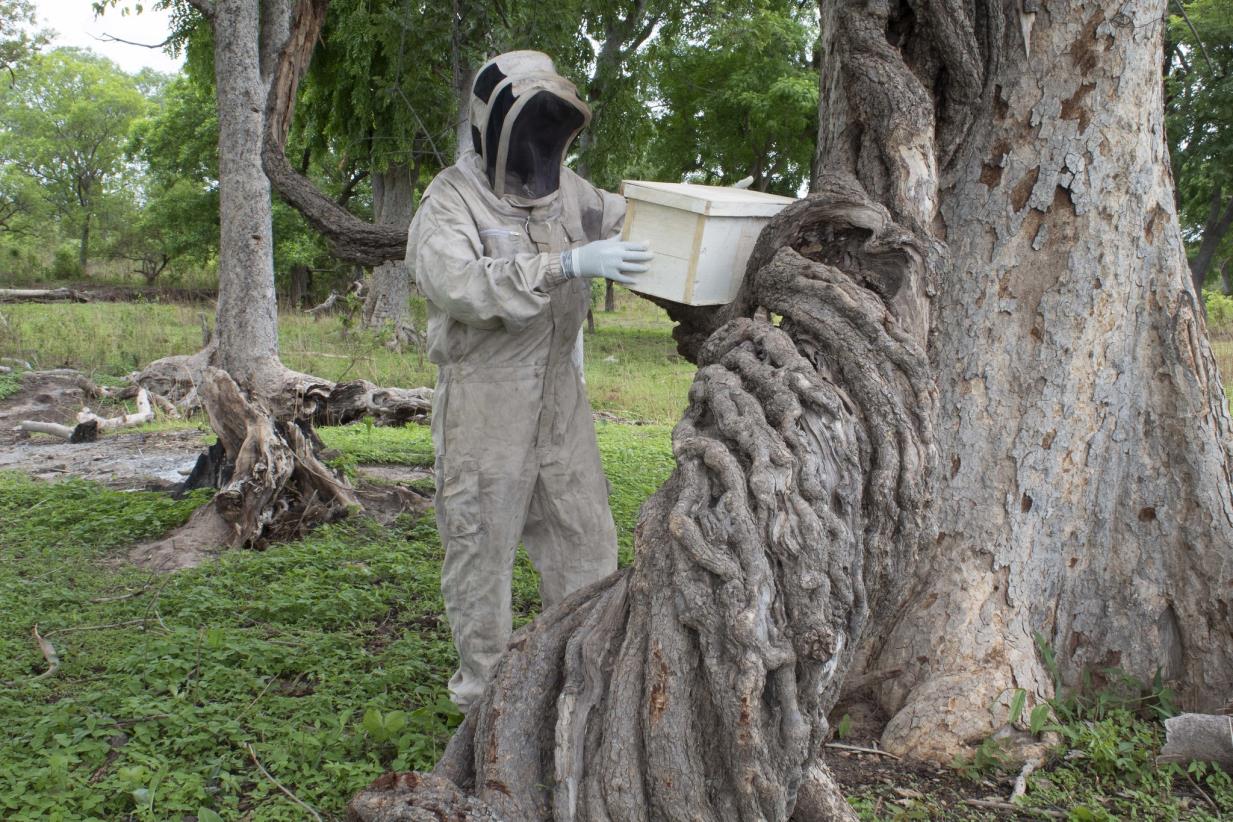Beekeepers working together for improved livelihoods, resilience and gender equality in Senegal

Honey from Casamance, an area in the south of Senegal, represents 70 percent of national production*. In spite of this, the region remains poor with approximately 50 percent of people affected by food insecurity and malnutrition**. Due to a lack of collaboration between actors involved in the sector, local beekeepers struggle to keep up with growing demand and export opportunities. These challenges are worsened by the impacts of the climate crisis with significant changes in temperature and precipitation patterns becoming more frequent.
Within the framework of the FAO Strengthening Agricultural Adaptation (SAGA) project funded by the Government of Quebec, the CasaMiel initiative led by FAO implementing partner Société de coopération pour le développement international (SOCODEVI) is working to increase the production of honey in Senegal while strengthening beekeepers’ resilience in the face of climate change, and reducing gender inequality in the sector.
The CasaMiel initiative is put into practice through Farmer Field Schools (FFS) which bring participants together to learn how to shift towards more sustainable production practices by better understanding complex agro-ecosystems and by enhancing ecosystem services. In this case, the FFS approach was adapted by SOCODEVI to place a strong emphasis on climate resilience, environmental protection and gender equality.
Between 2019 and 2020, the CasaMiel initiative trained 72 women and 75 men in the production of honey. One third of participants are young producers.
Working together to overcome the challenges of a changing climate
Between 2019 and 2020, the CasaMiel initiative collaborated with six groups of the CAC/Miel cooperative which each manage a processing unit and a honey packaging plant in the area. Through the initiative, these groups were provided with technical support and ten training workshops in the local language (Peulh). Each workshop was composed of a module on gender equality and training in good beekeeping practices across the supply chain, from the choice of the type of hive to the harvest and packaging of honey. As part of the initiative, a pictorial guide of the production, processing and packaging of honey in the context of climate change was co-produced with members of the cooperative and SOCODEVI, and published by FAO. “We wanted to increase our income to be able to pay for our children’s schooling and take care of our health. We lacked knowledge of good practices but I think today that has changed,” says Étienne Manga, a long-time beekeeper and president of the Ahoumoula cooperative group, in the Ziguinchor region of Casamance.
Beekeepers played a fundamental role in the FFS by identifying key social and climatic challenges to the production of honey as well as potential solutions. They shared various impacts of climate change on the environment including periods of shortened flowering, a resurgence of bush fires, and an increase in diseases and pest outbreaks. Adapting to climate change was a central point of the training: for each change observed, adaptation solutions were tested. For example, participants were trained in the manufacture of improved hives, less susceptible to bush fires and pests, and offering a cooler environment for bees. In response to specific requests from female beekeepers, the improved hives are also lighter and easier to handle.
At the end of the initiative, beekeepers are now equipped with 217 improved hives and 150 transport hives, as well as 300 illustrated guides
The gender equality components of the FFS aimed to promote discussion between men and women by addressing themes such as self-esteem, leadership and communication. Participants were requested to come with a partner also involved in beekeeping (spouse or member of the family). The presence of mixed pairs enabled participants to draw parallels between the inequalities discussed and their personal situation and thus initiate concrete changes within the household. “This is the first time my wife and I have participated in the same training. Today there is less misunderstanding between us in the management of the household and in our business activities,” explained Ousmane Baldé, husband of Bineta Baldé, both beekeepers from the village of Bagadaji.
Amplifying lessons learned, the value of a bottom-up approach
At cooperative level, a strategy is currently under development to continue the dissemination and adoption of good beekeeping practices, strengthen the link with local groups, and support the training of new members.
The CAC/Miel cooperative’s sale of honey increased from 2 816 litres in 2019 to 8 840 litres in 2021
Not only has the CasaMiel initiative had concrete impacts on the quality and quantity of honey produced in Casamance but it has proven the added value of community-based and participatory approaches when it comes to strengthening livelihoods, adapting to climate change and promoting gender equality. The initiative has demonstrated that many answers lie within the communities themselves. The results and lessons learned documented through the CasaMiel initiative can inform national adaptation planning across Senegal and beyond.
Learn more
Read the full SOCODEVI case study “Initiative Casamiel, pour une apiculture résiliente, productive et inclusive en Casamance” (French only)
Read beekeeping technical manual “Apiculture et changements climatiques: construire une filière résiliente” (French only)
Browse Strengthening Agricultural Adaptation (SAGA) in Senegal webpage
Browse photos
* Interview with Colonel Cheikh Daouda Diallo, National Coordinator of the Programme d’appui au développement économique de la Casamance (PADEC)
** Integrated Context Analysis in Senegal. 2017. https://docs.wfp.org/api/documents/WFP-0000070160/download/
